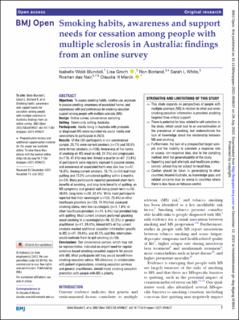| dc.description.abstract | Objectives:To assess smoking habits, nicotine use, exposure to passive smoking, awareness of associated harms, and experiences with and preferences for smoking cessation support among people with multiple sclerosis (MS).
Design: Online survey, convenience sampling.
Setting: Community setting, Australia.
Participants: Adults living in Australia with probable or diagnosed MS were recruited via social media and newsletters to participate in 2020.
Results: Of the 284 participants in our convenience sample, 25.7% were current smokers (n=73) and 38.0% were former smokers (n=108). Awareness of the harms of smoking on MS onset (n=68, 24.3%) and progression (n=116, 41.6%) was low. Almost a quarter (n=67, 23.8%) of participants were regularly exposed to passive smoke, and awareness of associated harm was also low (n=47, 16.8%). Among current smokers, 76.1% (n=54) had tried quitting and 73.2% considered quitting within 6 months (n=52). Many participants reported perceived short-term benefits of smoking, and long-term benefits of quitting, on MS symptoms and general well-being (short-term n=28, 40.0%; long-term n=28, 82.4%). While most participants reported that their neurologist (n=126, 75.4%) or other healthcare providers (n=125, 74.9%) had assessed smoking status, very few neurologists (n=3, 1.8%) or other healthcare providers (n=14, 8.4%) had provided help with quitting. Most current smokers preferred speaking about smoking to a neurologist (n=36, 52.2%) or general practitioner (n=41, 59.4%). Almost 60% of the current smokers wanted additional cessation information specific to MS (n=41, 59.4%), and 45.5% said this information would motivate them to quit smoking (n=30).
Conclusions: Our convenience sample, which may not be representative, indicated an urgent need for regular evidence-based smoking cessation supports for people with MS. Most participants felt they would benefit from smoking cessation advice. MS clinicians, in collaboration with patient organisations, smoking cessation services and general practitioners, should make smoking cessation promotion with people with MS a priority. | en_US |

